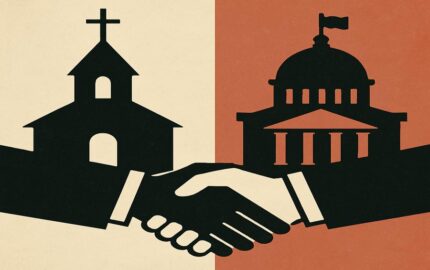Do God and government mix?
The atheist-humanist call to keep God out of the public square seems to resonate intuitively with many people today. Even some religious people seem to think that religion and politics should not mix. The argument is often made that, if only we have a broadly liberal state, then we can have a pluralist society in which people can practice their religion in private whilst it is kept out of politics.
But this argument fails, even at the level of logic – never mind the level of practice. Just consider the concept of a “broadly liberal and pluralistic state”. Such beliefs assume a set of values that must come from somewhere. Why, for example, a broadly liberal and pluralistic state rather than a totalitarian state or total anarchy?
In fact, we have a better answer to that question than atheist-humanists do. It is because we believe in God-given free will. And we also believe in original sin. So, we understand the dangers of totalitarianism and anarchy; and we understand why the state should serve individuals, families, and civil society and not the other way round.
The atheist-humanists (and their fellow travelers) argue that our politics and law should be based on reason and empirical evidence alone. They espouse this as a neutral world view. But it is not neutral. Arguing that there is nothing to life beyond reason, evidence and physical experiences is just as much an act of faith as believing that God is a reality who should influence our public life. Indeed, 90 per cent of the world’s population, and most of our country’s population, believe that there is something beyond reason and empirical evidence. And it is a matter of fact that our laws and institutions – including the monarchy – are based on Christian principles. The degree to which this was explicit in the coronation service for King Charles III was very notable.
Government without God
And we can ask the question “where does government without God lead?”
Pope Benedict, in his address to parliament in 2010, said: “The central question at issue, then, is this: where is the ethical foundation for political choices to be found? The Catholic tradition maintains that the objective norms governing right action are accessible to reason…According to this understanding, the role of religion in political debate is not so much to supply these norms, as if they could not be known by non-believers…but rather to help purify and shed light upon the application of reason to the discovery of objective moral principles.” In other words, faith and reason complement each other, and faith helps purify reason.
Indeed, as the same pope pointed out, when we try to perfect society by reason alone, we can end up with tyranny – as in the example of the terror of the French Revolution, or the millions killed by communist regimes. These were the result of radical atheists trying to build heaven on earth and ending up inflicting hell. We see this in smaller ways in the policies of modern-day atheist-humanists. They explicitly call, for example, for Catholic schools not to be funded by taxpayers – as if Catholics are not taxpayers and there can, somehow, be a school which has a neutral set of values. In reality, this is a call by atheist-humanists for state monopoly secular schooling dictated by their values.
A society built on rightly ordered religious principles is nothing to fear, even if you are not religious. We believe in original sin and so reject the idea that we can coercively build the perfect society or allow anarchy to prevail. We believe in free will and so do not want to build a theocracy. But we also believe in the God-given human dignity of all persons, so we reject the utilitarian idea that some people can be sacrificed for the greater good of the whole. And we also reject the idea that a free society should degenerate into a state in which the weak are simply left to fend for themselves.
If I were a non-religious person and realistic alternatives were put before me about how to order a state, I would choose this religious conception. We should not be shy in pointing out that our conception of the state is a great gift to the world.
What is the purpose of government
So, this leads to the question of “what is the purpose of a government with Christian principles?”.
In the Catholic tradition, the role of government is to promote human dignity and the common good. There is much debate amongst Christians about how best to use the structures of the state to promote human dignity in a general sense. But worth mentioning in the context of recent debates is that human dignity is not protected if the lives of the most dependent, voiceless and weakest (for example, the unborn and the disabled) and those nearing death are not properly protected: human dignity applies to all. The common good is often thought to be (because even Christians tend to absorb a secular narrative by osmosis) a kind of substitute phrase for the “general welfare” (as opposed, for example, to my own individual interests). But we are not Benthamite utilitarians. The common good is about what is good as well as what is common. The common good in the political domain relates to that set of common conditions which can lead us, individually and collectively, to effectively strive for perfection or fulfilment. And social justice, that often used – and rarely defined – phrase, is the form of justice that promotes the common good.
Again, there is the possibility for both misunderstanding and different perspectives here. But the first thing to say is that the idea of a society where everybody can reach perfection might not sound much better than the communist or French revolutionary ideal which ends in tyranny. It might sound like a theocracy, but it isn’t. We believe in free will and original sin. Our belief in original sin informs us that the power of government must be limited. Our belief in free will informs us that we do not really reach perfection until we can choose what is good. So, the role of government here is to develop institutions that nurture freedom in the best sense of the word: the freedom to choose what is good. The first of these institutions, of course, is the family; another is the Church and all her charitable works. Indeed, there has to be a wide variety of free institutions which have their own common good whilst contributing to the common good of the whole.
A government that allows violent crime, political corruption or rampant inflation or inflicts cruel punishments without the possibility of reform and redemption is not promoting the common good or human dignity. These point to obvious responsibilities of government. Whether, and to what extent, and in what circumstances, we should ban or regulate pornography, fatty foods or gambling or regulate labour markets are matters for what we call “prudential judgement”.
The role of civil servants
What might be the role of civil servants or government administrators in this scheme of thinking? I am a great fan of the TV series “Yes Minister”. Many civil servants regard it as a training series to help them do their job better. But it isn’t. It is the opposite. In fact, Yes Minister has academic roots. One of the authors attended seminars given by an economics Nobel Prize winner on the discipline of public choice economics: these seminars were about how interest groups and civil servants were able to pursue their own interests in a democracy against the interests of the people.
It is not the job of civil servants to set the policy agenda by imposing their views but to help the government implement policy. But civil servants can be tempted to pursue their own agenda. And there is a danger, of course, that good civil servants and regulators understand their role and fulfil it appropriately and with restraint whereas those with an agenda antithetical to the Christian one overstep the mark and pursue their own agendas and thereby abuse their powers.
As Pope Francis’s wrote in Fratelli Tutti: “Others may continue to view politics or the economy as an arena for their own power plays. For our part, let us foster what is good and place ourselves at its service.”
Civil servants do, of course, face tricky issues. What should they do if it is their job to implement legislation that is clearly immoral? Might civil servants be able to make secondary legislation better – from a Catholic point of view – by hiding something from the minister or telling him or her lies? What if a civil servant sees dishonesty and their job may be in peril if they report it?
After the financial crisis, many Catholics in business reflected on the Catholic cardinal virtues – this way of thinking has resonance amongst non-believers. They thought about how they should bring the virtues of courage, justice, prudence and temperance into their daily work. That is something that could be brought into the work of those who serve government too – perhaps by creating case studies.
We have the example, of course, of St. Thomas More who exhibited all these virtues and, in the end, had to choose to go against the king – and lose his head. Again, to quote Pope Benedict XVI: “In particular, I recall the figure of Saint Thomas More…who is admired by believers and non-believers alike for the integrity with which he followed his conscience, even at the cost of displeasing the sovereign…because he chose to serve God first.”
If we are going to bring God into government, Christians working for government should bring God into their daily work. Bishop Richard Moth, chair of the Catholic Bishops’ Conference of England and Wales said in his statement for the jubilee for workers: “I also ask Catholics to try to find some time for prayer during the working day – even if it is only a moment or two.”
Stalin asked how many divisions the pope had. If we truly believe that the world is governed by more than reason and empirical evidence, those who work in government should never forget to call upon our heavenly divisions in daily work: including, of course, for the intercession of St. Thomas More.
—
Image by ChatGPT







